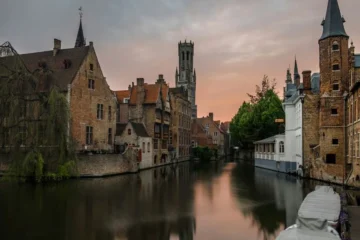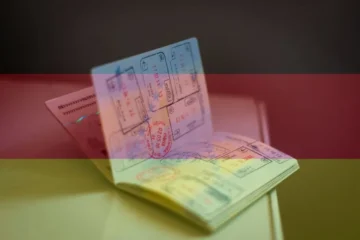Germany: a land where punctuality is practically a religion, sausages have their own fan base, and the autobahns are basically Mario Kart for grown-ups. But beyond the stereotypes lies one of Europe’s strongest economies, making it a top destination for skilled workers and expats worldwide.
If you’re looking to settle down in the heart of Europe and eventually make Germany your long-term home, you’re in the right place. This guide walks you through how to get permanent residency in Germany, particularly through the Blue Card route, which is the fast track for skilled professionals.
Key Takeaways
Whether you’re eyeing the efficiency of Munich, the buzz of Berlin, or just want to live where trains run on time (mostly), here’s what you need to know.
What Is a German Permanent Residence Permit (Niederlassungserlaubnis)?
The Niederlassungserlaubnis (say that five times fast) is Germany’s version of a permanent residency permit. It allows non-EU citizens to:
- Live and work in Germany indefinitely
- Change jobs freely without additional permissions
- Enjoy near-equal rights to German citizens (minus voting)
- Access social benefits, education, and healthcare
- Apply for German citizenship later (after typically 6–8 years total stay)
It’s the final destination before you start humming “Du Hast” with a German passport.
Popular Pathways to Permanent Residency in Germany
There’s more than one road to becoming a permanent resident in Germany, depending on your status and how long you’ve been here. But the two most common routes are:
- EU Blue Card Holders
- Standard Work Residence Permit Holders
Also Read: How to Get Permanent Residency in the UK – Guide (2025)
Let’s explore the Blue Card route first, since it’s the faster one, and a favourite among skilled migrants.
Pathway 1: From EU Blue Card to Permanent Residency
The EU Blue Card is a special residence permit for highly skilled non-EU professionals, designed to attract global talent. It offers a shortcut to PR compared to standard residence permits.
🔹 Who Can Apply for a Blue Card?
To be eligible, you must:
- Have a university degree or equivalent qualification
- Hold a job offer or employment contract in Germany
- Earn a minimum gross annual salary (as of 2025, approx. €45,300 or €41,000 in shortage occupations like IT, engineering, medical fields)
- Have your qualifications recognized in Germany
🔹 Timeline to PR with a Blue Card:
- After 33 months: You can apply for permanent residency if you’ve held your Blue Card and been employed the entire time.
- After just 21 months, If you can prove B1 level German language skills, you’re eligible to apply even sooner.
Yes, learning German not only helps you order bratwurst like a local—it actually saves you 12 months in your PR journey.
🔹 What You’ll Need for the PR Application:
- Valid passport and Blue Card
- Proof of employment for the required period
- Payslips and social contribution statements
- Proof of accommodation in Germany
- Health insurance coverage
- German language certificate (if going for the 21-month fast track)
Pathway 2: Other Residence Permit Holders
If you’re not on a Blue Card but hold another type of residence permit (like a work permit or family reunification visa), you can still apply for permanent residency—just with a slightly longer timeline.
🔹 General Requirements:
- Minimum 5 years of legal residence in Germany
- A secure livelihood (i.e., a job or steady income)
- Paid into the German pension system for at least 60 months
- Sufficient German language skills (usually B1 level)
- Adequate accommodation and health insurance
- No criminal record (Germany takes this one very seriously)
This is the standard PR route for most non-EU immigrants, including students who stay and work after graduation.
Students & Graduates: Can You Get PR in Germany?
Yes! Germany loves its international graduates. If you studied at a German university and then stayed on a job-seeking visa, you can eventually work your way toward PR. Here’s a rough roadmap:
- Study in Germany
- Apply for an 18-month job-seeking visa after graduation
- Get a skilled job and switch to a work permit or Blue Card
- After a few years of employment, PR awaits!
Your study years won’t fully count toward the 5-year PR requirement, but they can shorten the path when combined with post-study work.
Cost of Applying for PR in Germany (2025)
Applying for permanent residency is relatively affordable in Germany compared to some other countries. Here’s what you can expect:
- Application Fee: €113 (standard)
- For Blue Card holders (fast track): €113
- Students transitioning to PR: €113
- Additional costs: Language courses, document translations, notary services (~€200–€500 depending on case)
Considering this leads to lifetime residency? Not too shabby.
Processing Time
On average, it takes 4 to 8 weeks for the permanent residency application to be processed, provided all documents are in order. In some busy immigration offices, it might take a little longer because even German bureaucracy needs a coffee break.
Why Consider German Permanent Residency?
- Stability: No more visa renewals or uncertainty.
- Freedom: Change jobs or employers without reporting.
- Security: Access to healthcare, pension, and other benefits.
- Citizenship Path: You’re eligible to apply for German citizenship after usually 6–8 years of total residence.
- EU Access: Germany PR makes it easier to move around or work in other Schengen countries.
Plus, let’s be honest—there’s something satisfying about finally mastering German paperwork and earning a status that lets you enjoy all the perks (and pain) of adulthood in Deutschland.
Final Thoughts
Getting permanent residency in Germany is entirely doable, especially if you’re a skilled worker on a Blue Card. With clear requirements and a structured process, the path to PR may feel a little bureaucratic, but it’s far from impossible.
Whether you’re drawn by the economy, the quality of life, or the glory of German Christmas markets, the PR route is your golden ticket to long-term life in one of Europe’s most powerful and organised nations.
So, start brushing up on your German, gather those payslips, and maybe grab a pretzel for the road—Germany awaits.
For more information, go to the official Website: https://www.make-it-in-germany.com/en/visa-residence/living-permanently/settlement-permit





